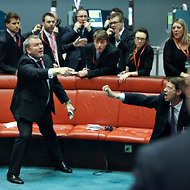 Chris Ratcliffe/Bloomberg NewsThe floor of the London Metal Exchange in 2010.
Chris Ratcliffe/Bloomberg NewsThe floor of the London Metal Exchange in 2010.
1:57 p.m. | Updated
Hong Kong Exchanges and Clearing agreed on Friday to buy the London Metal Exchange for £1.38 billion, or $2.14 billion, in another sign of Asia’s importance to the world’s commodities industry.
The Asian bourse, one of the world’s biggest financial exchanges based on market capitalization, outbid several American rivals for control of the 135-year-old London firm.
Despite concerns that the Chinese economy may be slowing down, the country and other emerging markets in the region now are the largest buyers of a number of commodities, such as iron ore and coal, as their domestic markets continue to report high levels of growth. The latest acquisition will help the Asian bourse take advantage of this demand.
“All the world’s leading exchanges have been fighting in this area,” Charles Li, chief executive of the Hong Kong exchange, said in an interview. “This is about growth and conquering new markets.”
The Hong Kong-based firm said it would pay £107.60 (about $167) for each share in the L.M.E. The deal will be presented to the London exchange’s shareholders by the end of July, according to a statement from the Hong Kong-based company.
The deal requires approval of at least 50 percent of the L.M.E.’s shareholders, who hold more than 75 percent of the firm’s stock. It also requires approval of British regulators.
The acquisition could provide a windfall for JPMorgan Chase and Goldman Sachs, which collectively own a 20.4 percent stake in the London-based exchange. The banks could pocket a combined $436 million through the transaction.
The Hong Kong bourse said it would not increase fees on trading contracts before 2015, a boon to smaller investors, which had been concerned that the acquisition would lead to a rise in the exchange’s trading fees. The acquisition prices for the L.M.E., which has around an 80 percent share in global futures trading for metals like aluminum, copper and zinc, is higher than analysts’ previous estimates. The premium underlines the lengths to which the Hong Kong exchange was willing to go for control of one of the world’s remaining independent exchange businesses.
Both NYSE Euronext and the CME Group made initial bids, but dropped out this year, according to a person with direct knowledge of the matter. InterContinental Exchange, the Atlanta-based firm, also had proposed buying the L.M.E., but was eventually outbid by the Hong Kong exchange.
Other exchanges have made unsuccessful attempts to acquire rival firms. NYSE Euronext and Deutsche Börse called off their planned merger after European antitrust regulators formally opposed the deal.
The Asian company’s acquisition of the London-based exchange will focus on increasing the number of Chinese participants on the L.M.E., Romnesh Lamba, head of market development at the Hong Kong Exchange, said in an interview.
Currently, less than a quarter of the L.M.E.’s customers hail from China, and Mr. Lamba said there were plans to create Chinese currency-based contracts and allow for clearing of trades in Asia to help increase the number of regional users. The changes would take place over the next three years, he added.
The Hong Kong exchange also is hoping to gain Chinese government approval to use local warehouses to provide commodities for domestic customers. Chinese regulations currently do not allow foreign exchanges to operate mainland warehouses.
The L.M.E. already has an office in Singapore, and operates commodities warehouses across the region, as well as in North America and Europe.
The deal will allow the Asian exchange, which holds a monopoly in the securities and futures market in Hong Kong, to diversify into other forms of trading.
Volatility in the financial markets has led to the postponement or cancellation of several initial public offerings on the Hong Kong exchange. So far in 2012, the total dollar value of new listings on the Asian bourse has fallen by more than 90 percent compared with the same period last year, according to the data provider Dealogic.
Analysts say the acquisition of the L.M.E. will help to offset this fall in new I.P.O.’s. Fueled by demand for commodities from emerging markets, total trading on the L.M.E. last year increased by 22 percent from 2010. The value of all traded contracts also rose to $15.4 trillion, a 33 percent jump from 2010.
The Hong Kong exchange said it would pay for the acquisition through cash reserves and combined bank loans of at least £1.1 billion from the China Development Bank, Deutsche Bank, HSBC and UBS.
Rothschild, UBS and the law firm Allen Overy advised Hong Kong Exchanges and Clearing, while Moelis Company and the law firm Freshfields Bruckhaus Deringer advised the London exchange.
Article source: http://dealbook.nytimes.com/2012/06/15/hong-kong-exchange-to-buy-london-metal-exchange-for-2-1-billion/?partner=rss&emc=rss